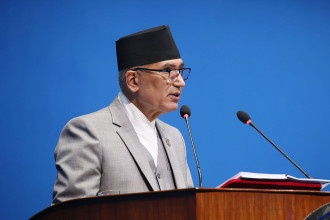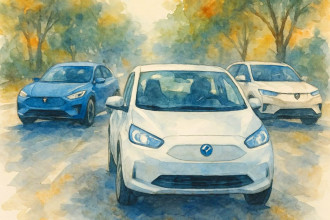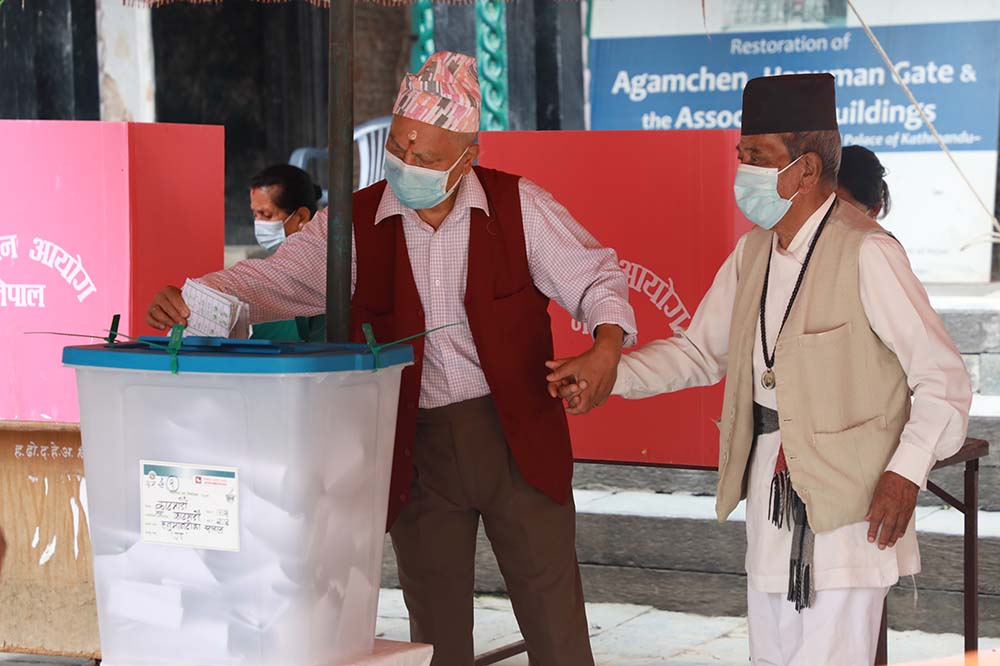
With the government’s decision to hold the general and provincial elections on November 20, political parties are gearing up with attention now on candidate nominations for regional and central committees of respective parties. The Election Commission — the constitutional body that is responsible for holding elections and referendums — has already unveiled the election schedule under which candidates have to file their nominations on October 9. Chief Election Commissioner, Dinesh Kumar Thapaliya has said that the Commission will unveil the final list of the candidates by October 11, after following due processes such as claims and counterclaims regarding candidacies, evaluation of complaints lodged by various stakeholders, and verification by the Election Commission.
The number of political parties registered with the Election Commission for the general elections is 86 for direct (first-past-the-post system) and the number of electoral symbols is 78 because candidates can make use of the symbol of any political party if that particular political party allows them to use their symbol while contesting the election. A total of 76 parties are registered to contest under the proportional system for the House of Representatives. In Nepal, the House of Representatives comprises of 275 members - 165 elected from single-member constituencies through first-past-the-post voting mechanism and 110 candidates are elected through the proportional electoral system where voters vote for political parties, considering the entire country as a single election constituency. Likewise, there are 330 candidates elected from provincial constituencies through first-past-the-post system and seven - one from each province - elected through proportional representation.
For provinces, the political party must register in the concerned province to file candidacy for the election. For example, a political party registered in Madhesh Province can nominate candidates for Madhesh only, and not any other provinces.
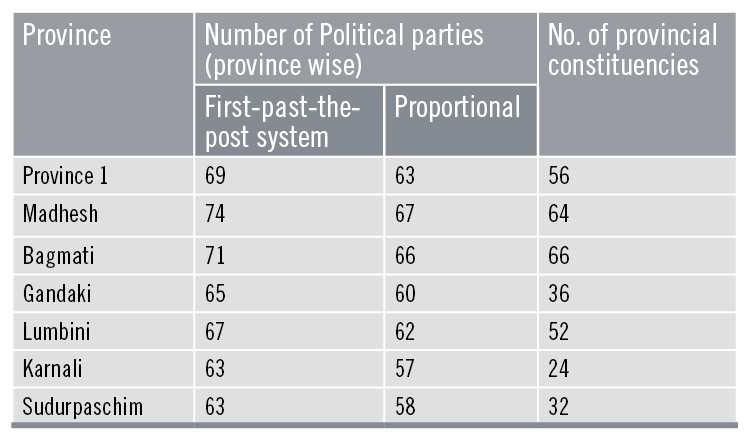
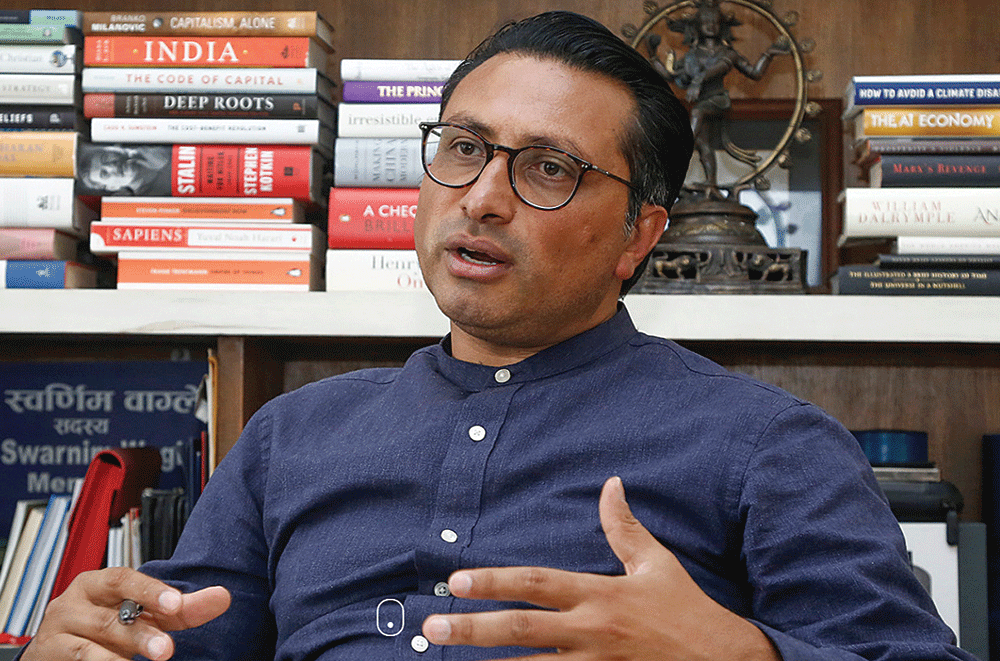 Corruption and ineptitude plague the Nepali government and keep it from reaching its full potential. There are parallels to the leaders of a number of African countries whose officials emerge as revolutionary heroes but later begin to consolidate power through increasingly corrupt means within government systems that lack checks and balances such as strict term limits. Nepal has been facing the same plight like what the Philippines had faced during 1965-1986 from characters like Imelda Romualdez Marcos.
Such corruption has led to collusion and anti-competitive behaviour between the private sector and government.
On the other hand, high cost of running for office relative to the average wage, which presents another barrier for aspiring politicians to build and fund a campaign through honest means. Enlightened voters are the only remedy to dismantle bad governance and slow growth.
As per theory in which “bad” political candidates reinforce lower “enlightened” voter participation, while “good” political candidates reinforce higher “enlightened” voter participation.
When voter participation is not enlightened, we’re not demanding, we’re not asking for accountability; and this perpetuates itself.
Simple reforms that come from good governance would accelerate economic growth, setting a standard for voters about what policy can achieve. With this model, Nepal was on the tipping point between two equilibriums — one in which Nepal is cemented in a state of corruption, and the other in which Nepal’s democracy is self-reinforcing.
READ ALSO:
Corruption and ineptitude plague the Nepali government and keep it from reaching its full potential. There are parallels to the leaders of a number of African countries whose officials emerge as revolutionary heroes but later begin to consolidate power through increasingly corrupt means within government systems that lack checks and balances such as strict term limits. Nepal has been facing the same plight like what the Philippines had faced during 1965-1986 from characters like Imelda Romualdez Marcos.
Such corruption has led to collusion and anti-competitive behaviour between the private sector and government.
On the other hand, high cost of running for office relative to the average wage, which presents another barrier for aspiring politicians to build and fund a campaign through honest means. Enlightened voters are the only remedy to dismantle bad governance and slow growth.
As per theory in which “bad” political candidates reinforce lower “enlightened” voter participation, while “good” political candidates reinforce higher “enlightened” voter participation.
When voter participation is not enlightened, we’re not demanding, we’re not asking for accountability; and this perpetuates itself.
Simple reforms that come from good governance would accelerate economic growth, setting a standard for voters about what policy can achieve. With this model, Nepal was on the tipping point between two equilibriums — one in which Nepal is cemented in a state of corruption, and the other in which Nepal’s democracy is self-reinforcing.
READ ALSO:

Politics: A lucrative business
Politics seems to be a lucrative sector in Nepal as it gives you three of the most influential ‘P’s’ - power, paisa (money) and politics itself. In one of his speeches, Jaggi Vasudev, popularly known as Sadhguru said, “We should change the definition of politics rooted in our mind, politics is power to enact politics. Politics doesn’t mean working against each-other.” However, to the public mind, political institutions, mainly political parties, the parliament and others are disoriented from their motto to serve the people and the country. For them, politics is only a tool to gain power and rule. Many believe that the ongoing trend can only be corrected by electing ‘good and honest’ people during the election. The ultimate authority to make this happen are the people, who use their sovereign right of voting to elect their representatives during the periodic elections. There is a new wave of ‘independent candidates’ in the Nepali political spectrum at present which was triggered during the recently held elections of the local government. This had been attributed to people’s frustration with the established political parties. They thus chose to elect independent mayoral candidates in many places including the Kathmandu valley. Aspiring youths in political leadership have been supporting the independent movement because the incumbent leaderships of the major political parties have been occupying leadership positions for long without making any notable change for the good of the country.Elections: A costly affair
During the local election 2022, the Election Commission spent Rs 5.16 billion, and this does not include the cost of security. The expenses made by the political parties themselves are again a totally different set of mathematics. As per the Election Commission, Rs eight billion was spent for the general and provincial elections of 2017. The government has earmarked Rs 10 billion for the Election Commission to conduct the general and provincial elections in November this year. Taking into account the growing population who are eligible to vote, the Election Commission has arranged for a total of 22,226 polling booths across the country for 17,988,570 registered voters, according to Shaligram Sharma Poudel, Spokesperson of the Election Commission. The Election Commission allows expenses of up to Rs 2.5 million for candidates contesting for their representation in the Federal Parliament and Rs 1.5 million for those contesting for Provincial Assembly. Likewise, those nominated for proportional representation are allowed to spend up to Rs 2 lakh irrespective of the candidate contesting for House of Representatives or Provincial Assembly. However, the amount that candidates can spend for their election campaign could be reviewed this time, according to Chief Election Commissioner Thapaliya. Though there is a huge difference between the benchmarked expenses allowed by the Commission and the actual expenses made by the political parties, the Election Commission has failed to take any action against those who try to woo voters with various incentives including money. Just some months back, a senior leader of Nepali Congress, Shashank Koirala, said at a public programme that he had spent Rs 60 million during the parliamentary election of 2017. Those in the race are expressing disappointment at the costly affair that elections have turned out to be and share that this is a major reason behind the rampant corruption prevalent in Nepal today. Elected representatives’ resort to bribes, commissions and incentives to refund the amount spent during elections which has ensured that corruption thrives, democratic institutions are weakened, and the rule of law is breached. Last month, Communist Party of Nepal (Maoist Centre) supremo Pushpa Kamal Dahal, also known as Prachanda, mentioned that a single mayoral candidate spent as high as Rs 100 million on the local elections. He also stated that this has led to the entry of super rich or those making money dishonestly, like price speculation of real estate and stocks; excavation of stone and sand from rivers and exploiting other natural resources; forgery; smuggling, drugs; and poor-quality delivery of government contracts, in politics which is a threat to those lacking sufficient wealth. These are but just a few glaring examples of election expenses and the threat to displace those who carry principles of honesty, integrity, and morality. Ultimately, society will have to pay the price in one way or another.Security management
One of the major attributes of any election is that it must be fair and peaceful. A huge number of security personnel must be mobilised for safety at the voting booths and ballots and to control rigging and counter possible criminal activities targeting the election. The Commission in this regard has asked the government to manage proper security, which is inspected by the Election Commission, National Human Rights Commission and independent election observers. According to the Ministry of Home Affairs (MoHA), Rs 5.86 billion has been earmarked to hire temporary police for the election and Rs 750 million has been allocated for transportation purposes. Likewise, additional perks will be extended to the security personnel on top of their regular salaries and incentives. Thus, almost Rs 7.85 billion or more could be spent, according to MoHA.Who funds political parties and candidates?
A free and fair election is the most important democratic exercise where every single citizen who has completed the age of 18 has the general right to vote. Periodic elections are considered to be hallmark of democracy where people judge the candidates, political parties and use their voting rights based on the delivery of the politicos for national and civic development. Political parties generate funds through donation drives, and even resort to corruption, extortion, contribution from party cadres, well-wishers and voluntary contributions. It has been studied that it is mainly businesspeople, contractors and those who have earned money by dishonest means who provide donations to political parties, but here it must be noted that ultimately it is the money from the common tax payer and the consumer as the money if extracted through spike in prices of goods and services. There is also policy corruption and nexus in government procurement and delivery of substandard works, according to former Finance Secretary Rameshore Prasad Khanal. “We’ve been witnessing the trend of pork-barrel politics of allocating funds for electoral constituencies from the fiscal budget, where elected representatives have the discretion to develop projects through the allocated fund and that is being largely misused,” he said. Any plan is set by the political leaders, the contracts are administered by bureaucrats and development works carried out by contractors which means there is a complete nexus and lack of accountability, according to Swarnim Wagle, former Vice Chair of the National Planning Commission.Rs 5,000 for a single vote
It will be tough to track and rationalise the expenses made by political parties and candidates as they are not transparent regarding collection of funds and expenses during the election. For instance, in 2017 a senior and seasoned team of election observers had conducted an extensive six-month study after the local election of 2017 and their study revealed that political parties and their candidates had spent Rs 50.96 billion apart from the state mechanisms. The Election Commission and security forces had spent Rs 18.46 billion. While dividing the number of voters with that amount, it shows Rs 4,923 was spent for a single vote which is considerably a huge expense. Former Chief Election Commissioner, Bhoj Raj Pokharel, stresses that apart from unavoidable expenses required by the Election Commission and for security arrangement to ensure a fair and peaceful election, expenses of political parties must be controlled. He advises political parties to try woo voters through their manifesto, which entails their vision, plan, programme and action concerned with public service delivery through better governance rather than monetary and other short-term incentives that are distorting democracy and resulting in government and market failure. Public accountability is key for real change and free and fair elections. Should the voter decide not to participate or not to ask the right questions, those in government will continue to play the power game at high cost to democracy and development.‘Costly elections are the root of corruption’
Swarnim Wagle Public Policy Maker Corruption and ineptitude plague the Nepali government and keep it from reaching its full potential. There are parallels to the leaders of a number of African countries whose officials emerge as revolutionary heroes but later begin to consolidate power through increasingly corrupt means within government systems that lack checks and balances such as strict term limits. Nepal has been facing the same plight like what the Philippines had faced during 1965-1986 from characters like Imelda Romualdez Marcos.
Such corruption has led to collusion and anti-competitive behaviour between the private sector and government.
On the other hand, high cost of running for office relative to the average wage, which presents another barrier for aspiring politicians to build and fund a campaign through honest means. Enlightened voters are the only remedy to dismantle bad governance and slow growth.
As per theory in which “bad” political candidates reinforce lower “enlightened” voter participation, while “good” political candidates reinforce higher “enlightened” voter participation.
When voter participation is not enlightened, we’re not demanding, we’re not asking for accountability; and this perpetuates itself.
Simple reforms that come from good governance would accelerate economic growth, setting a standard for voters about what policy can achieve. With this model, Nepal was on the tipping point between two equilibriums — one in which Nepal is cemented in a state of corruption, and the other in which Nepal’s democracy is self-reinforcing.
READ ALSO:
Corruption and ineptitude plague the Nepali government and keep it from reaching its full potential. There are parallels to the leaders of a number of African countries whose officials emerge as revolutionary heroes but later begin to consolidate power through increasingly corrupt means within government systems that lack checks and balances such as strict term limits. Nepal has been facing the same plight like what the Philippines had faced during 1965-1986 from characters like Imelda Romualdez Marcos.
Such corruption has led to collusion and anti-competitive behaviour between the private sector and government.
On the other hand, high cost of running for office relative to the average wage, which presents another barrier for aspiring politicians to build and fund a campaign through honest means. Enlightened voters are the only remedy to dismantle bad governance and slow growth.
As per theory in which “bad” political candidates reinforce lower “enlightened” voter participation, while “good” political candidates reinforce higher “enlightened” voter participation.
When voter participation is not enlightened, we’re not demanding, we’re not asking for accountability; and this perpetuates itself.
Simple reforms that come from good governance would accelerate economic growth, setting a standard for voters about what policy can achieve. With this model, Nepal was on the tipping point between two equilibriums — one in which Nepal is cemented in a state of corruption, and the other in which Nepal’s democracy is self-reinforcing.
READ ALSO:
Published Date: September 30, 2022, 12:00 am
Post Comment
E-Magazine
RELATED Feature

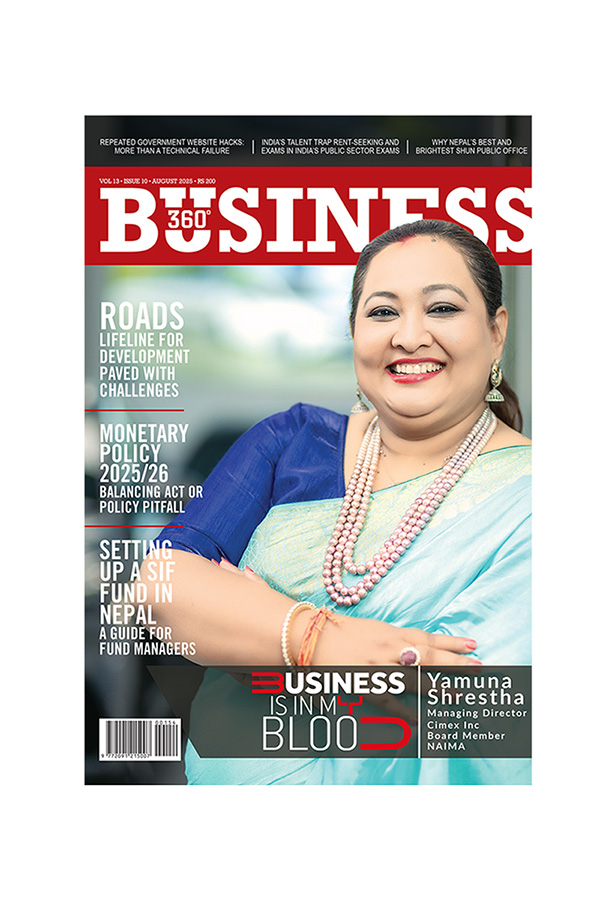
-1758006240.jpg)
-1752225714.jpg)
